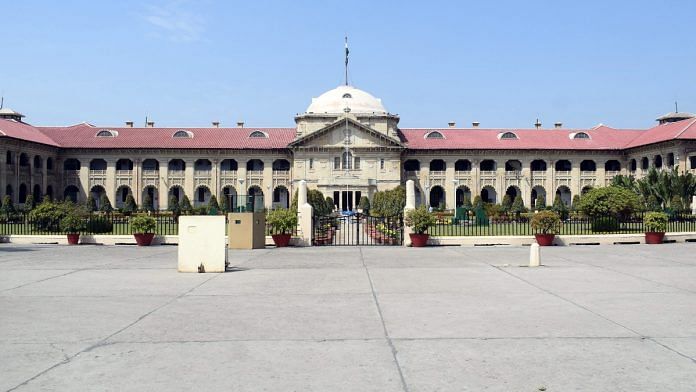New Delhi: If a Muslim man cannot take care of his wife and children, then the Quran does not allow him to marry a second time, the Allahabad High Court (HC) has observed while refusing to compel a Muslim woman to live with her husband who had married a second time.
In the 19 September judgment, made public in the past week, the court emphasised the fundamental rights of citizens and asserted that “it is requisite of the present day that people are made aware that it is obligatory to treat the women with respect and dignity”.
A bench comprising Justices Surya Prakash Kesarwani and Rajendra Kumar-IV said: “If a Muslim man is not capable of fostering his wife and children then as per above mandate of Holy Quran, he cannot marry the other woman.”
The couple in this case — Azizurrahman and Hamidunnisha — got married in May 1999 and have four children. Subsequently, Azizurrahman married a second time and also had children with the second wife.
According to the judgment copy, he had hidden this from his first wife Hamidunnisha and had also not offered any explanation to her for the second marriage. Hamidunnisha had then moved away and has since been living with her 93-year-old father.
In 2015, Azizurrahman approached a family court in Uttar Pradesh demanding restitution of conjugal rights — he wanted the court to direct his first wife to live with him.
The court rejected his plea in August this year, after which he approached the Allahabad HC.
In its judgment, the court referred to Surah 4 Ayat 3 of the Quran, which says, “If you fear that you might not treat the orphans justly, then marry the women that seem good to you: two, or three, or four. If you fear that you will not be able to treat them justly, then marry (only) one, or marry from among those whom your right hands possess. This will make it more likely that you will avoid injustice”.
Referring to the verse, the judgment read, “The religious mandate of Sura 4 Ayat 3 is binding on all Muslim men which specifically mandates all Muslim men deal justly with orphans and then they can marry women of their choice two or three or four but if a Muslim man fears that he will not be able to deal justly with them then only one.”
The court explained that a Muslim husband has a legal right to marry a second time while still being married to the first wife. However, if he then asks the court to compel his first wife to live with him, the court would not allow it if it feels that it would be “unjust and inequitable to compel her to live with him”.
The bench said that if a Muslim man, after taking a second wife against the wishes of the first, also wants the civil court’s assistance to compel the first to live with him, the court would “respect the sanctity of the second marriage, but it will not compel the first wife, against her wishes, to live with the husband under the altered circumstances and share his consortium with another woman, if it concludes, on a review of the evidence, that it will be inequitable to compel her to do so.”
Also Read: ‘Baby bail’ brouhaha, lessons on life & love — how livestreams are winning HC judges a fandom
‘Would violate wife’s rights’
The court also observed that the circumstances under which the second marriage took place are relevant in deciding whether the husband’s conduct in taking a second wife was in itself an act of cruelty to the first.
It asserted that hiding the fact that he got married a second time amounts to cruelty towards his first wife. The court, therefore, dismissed the appeal, calling it “totally frivolous”, asserting, “Under the circumstances, if the first wife does not wish to live with her husband-plaintiff appellant, then she cannot be compelled to go with him in a suit filed by him for restitution of conjugal rights.”
The court, in fact, felt that if the wife is forced to live with her husband under such circumstances, then it would “violate her fundamental rights guaranteed under Article 21 [Right to life and personal liberty] of the Constitution of India”.
(Edited by Theres Sudeep)
Also Read: 1 mn backlog, 37% vacancies, but Allahabad HC lawyers don’t want ‘outsiders’ to fill judges’ ranks



